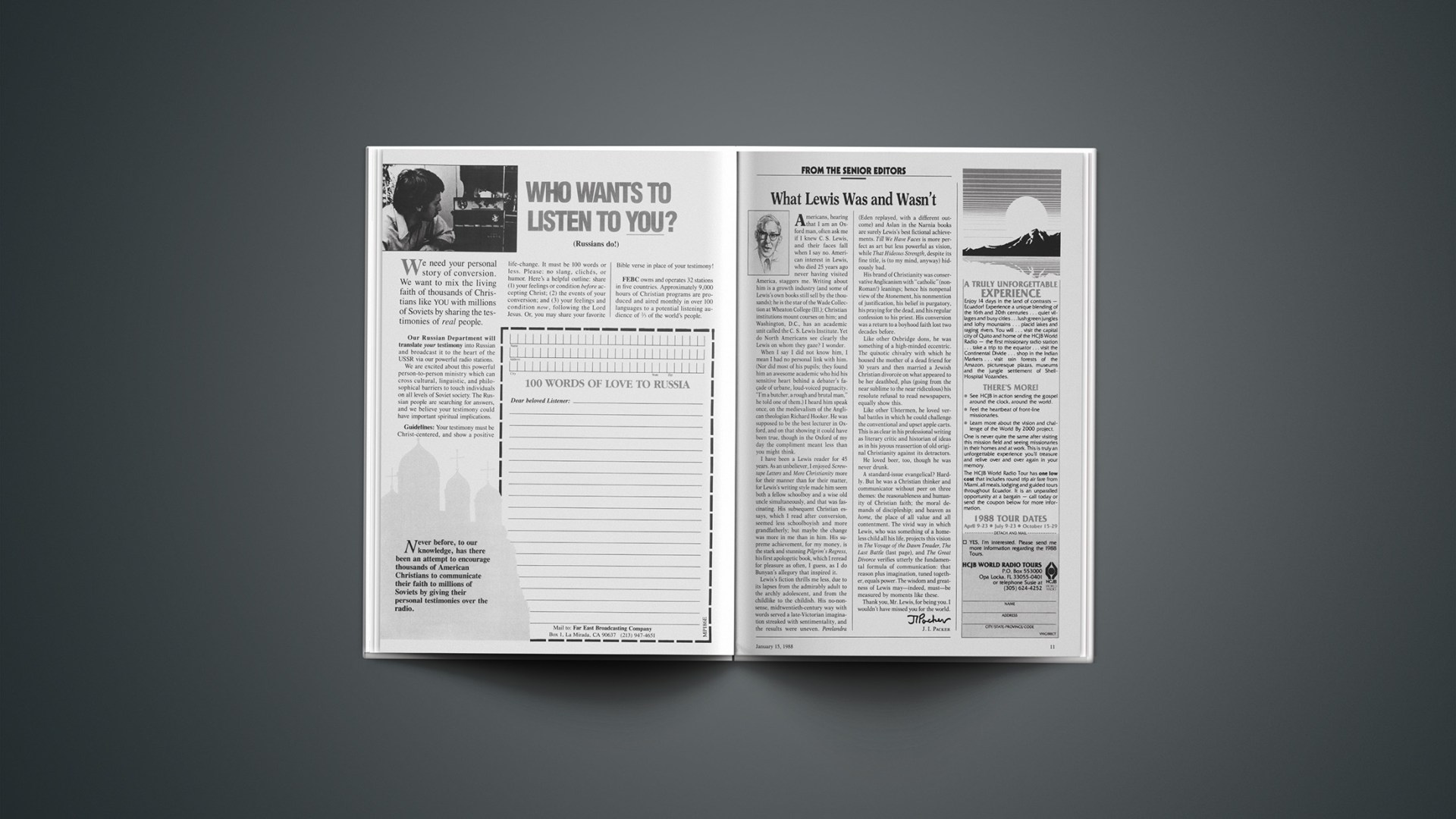Americans, hearing that I am an Oxford man, often ask me if I knew C. S. Lewis, and their faces fall when I say no. American interest in Lewis, who died 25 years ago never having visited America, staggers me. Writing about him is a growth industry (and some of Lewis’s own books still sell by the thousands); he is the star of the Wade Collection at Wheaton College (Ill.); Christian institutions mount courses on him; and Washington, D.C., has an academic unit called the C. S. Lewis Institute. Yet do North Americans see clearly the Lewis on whom they gaze? I wonder.
When I say I did not know him, I mean I had no personal link with him. (Nor did most of his pupils; they found him an awesome academic who hid his sensitive heart behind a debater’s façade of urbane, loud-voiced pugnacity. “I’m a butcher, a rough and brutal man,” he told one of them.) I heard him speak once, on the medievalism of the Anglican theologian Richard Hooker. He was supposed to be the best lecturer in Oxford, and on that showing it could have been true, though in the Oxford of my day the compliment meant less than you might think.
I have been a Lewis reader for 45 years. As an unbeliever, I enjoyed Screwtape Letters and Mere Christianity more for their manner than for their matter, for Lewis’s writing style made him seem both a fellow schoolboy and a wise old uncle simultaneously, and that was fascinating. His subsequent Christian essays, which I read after conversion, seemed less schoolboyish and more grandfatherly; but maybe the change was more in me than in him. His supreme achievement, for my money, is the stark and stunning Pilgrim’s Regress, his first apologetic book, which I reread for pleasure as often, I guess, as I do Bunyan’s allegory that inspired it.
Lewis’s fiction thrills me less, due to its lapses from the admirably adult to the archly adolescent, and from the childlike to the childish. His no-nonsense, midtwentieth-century way with words served a late-Victorian imagination streaked with sentimentality, and the results were uneven. Perelandra (Eden replayed, with a different outcome) and Aslan in the Narnia books are surely Lewis’s best fictional achievements. Till We Have Faces is more perfect as art but less powerful as vision, while That Hideous Strength, despite its fine title, is (to my mind, anyway) hideously bad.
His brand of Christianity was conservative Anglicanism with “catholic” (non-Roman!) leanings; hence his nonpenal view of the Atonement, his nonmention of justification, his belief in purgatory, his praying for the dead, and his regular confession to his priest. His conversion was a return to a boyhood faith lost two decades before.
Like other Oxbridge dons, he was something of a high-minded eccentric. The quixotic chivalry with which he housed the mother of a dead friend for 30 years and then married a Jewish Christian divorcée on what appeared to be her deathbed, plus (going from the near sublime to the near ridiculous) his resolute refusal to read newspapers, equally show this.
Like other Ulstermen, he loved verbal battles in which he could challenge the conventional and upset apple carts. This is as clear in his professional writing as literary critic and historian of ideas as in his joyous reassertion of old original Christianity against its detractors.
He loved beer, too, though he was never drunk.
A standard-issue evangelical? Hardly. But he was a Christian thinker and communicator without peer on three themes: the reasonableness and humanity of Christian faith; the moral demands of discipleship; and heaven as home, the place of all value and all contentment. The vivid way in which Lewis, who was something of a homeless child all his life, projects this vision in The Voyage of the Dawn Treader, The Last Battle (last page), and The Great Divorce verifies utterly the fundamental formula of communication: that reason plus imagination, tuned together, equals power. The wisdom and greatness of Lewis may—indeed, must—be measured by moments like these.
Thank you, Mr. Lewis, for being you. I wouldn’t have missed you for the world.
J. I. PACKER










